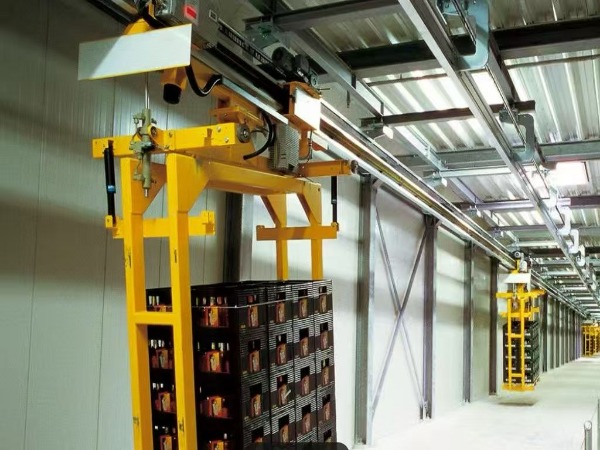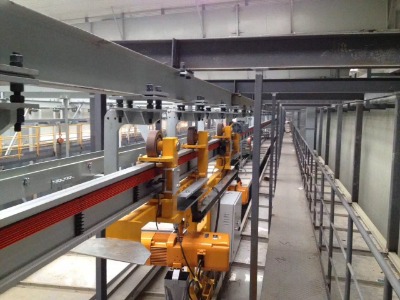When we enjoy the vast array of food products from supermarkets or savor convenient and delicious meals at restaurants, we seldom think of a seemingly simple yet crucial component—the food-grade wheel. In fact, from raw material storage and production processing to warehousing, logistics, and final sales, wheels silently function within the bloodstream of the food industry. They carry efficiency, safety, and hygiene, serving as the cornerstone that ensures the smooth operation of modern food systems. This article will explore in depth the critical role of wheels in the food industry and their indispensable specialized characteristics.

1. The Indispensable Foundation: Why Are Wheels So Crucial to the Food Industry?
Imagine a food industry without wheels. Heavy bags of raw materials would have to be carried manually, massive mixing tanks would be fixed in place, goods in warehouses would pile up and become difficult to move, and supermarket restocking efficiency would plummet. The application of wheels has completely transformed this scenario.
Engine of Efficiency: Wheels enable the mobility of materials and equipment. Mobile hoppers, trolleys, and pallet trucks allow raw materials, semi-finished products, and final goods to flow quickly between different processes and areas, creating continuous and efficient production lines that dramatically increase productivity.
Guardian of Hygiene: The food industry has extremely strict hygiene requirements. Equipment equipped with casters can be easily moved out of the production line for thorough cleaning and disinfection, effectively eliminating sanitary blind spots and preventing cross-contamination. This provides a fundamental safeguard for food safety.
Optimizer of Space: In warehousing, mobile shelving systems such as compact racks use tracks and rollers to achieve dense shelving arrangements and on-demand movement, storing several times more goods in the same floor area, significantly improving space utilization.
Enabler of Flexibility: In restaurant kitchens, supermarket floors, and other settings, workbenches, display cabinets, and promotional shelves equipped with casters can be reconfigured at any time according to operational needs, providing great spatial flexibility to adapt to different workflows and sales strategies.
In short, the rolling of wheels directly drives the scale, standardization, and efficiency of modern food industry operations.
2. Far From Ordinary: What Kind of "Special Forces" Does the Food Industry Need?
The food industry operates in complex and demanding environments, meaning the wheels used must be specially engineered "special forces," not ordinary casters. They must possess the following key characteristics:
Material: The First Line of Safety and Durability
Food Safety Certification: Materials of wheels that directly or potentially contact food must comply with international food safety standards (such as U.S. FDA or EU EC 1935/2004). Common compliant materials include:
Polyurethane (PU): Wear-resistant, high load capacity, odorless, easy to clean, and leaves no marks on floors.
Nylon: High hardness and impact resistance, suitable for heavy-duty applications.
Special Modified Rubber: Offers good elasticity and quiet operation, but must be free of toxic additives.
Corrosion Resistance: Wheels must resist corrosion from acidic and alkaline cleaners, oils, fats, and salts to withstand rigorous daily cleaning procedures.
High/Low Temperature Resistance: From the low temperatures of cold storage to the high heat near ovens, wheel materials must remain stable—neither cracking nor softening.
Structural Design: Engineered for Hygiene and Efficiency
Anti-Tangling Design: The wheel surface should be smooth and seamless to prevent entanglement with hair, threads, or debris, facilitating cleaning and ensuring smooth operation.
Load Capacity and Shock Absorption: Wheels must be selected based on load requirements—ranging from lightweight meal carts to racks weighing several tons. High-quality wheels provide excellent shock absorption, protecting equipment and contents (such as fragile eggs or pastries) during transport.
Fully Sealed Bearings: The bearing is the heart of the wheel. Fully sealed bearings effectively prevent the ingress of water, dust, and bacteria, ensuring long-term smooth rotation, reducing maintenance, and extending service life.
Reliable Braking System: For equipment requiring precise positioning (e.g., meal carts, workbenches), casters with effective brakes are essential for safe operation, especially on sloped surfaces.
Application-Specific Requirements
Production Facilities: Heavy-duty, corrosion-resistant, and easy-to-clean nylon or polyurethane wheels are preferred.
Cold Chain Warehousing: Wheels made from low-temperature-resistant materials are required to ensure rubber does not become brittle and performance remains reliable in freezing environments.
Commercial Food Service: Quiet, non-marking, and aesthetically pleasing wheels are prioritized, making polyurethane and high-quality rubber wheels ideal choices.
3. A Panoramic View of Applications: Wheels Throughout the "Farm-to-Fork" Journey
Let’s follow the journey of a food product to see how wheels operate at every stage:
Origin: Raw Material Receiving – Forklifts and pallet trucks equipped with wheels unload bulk raw materials from delivery trucks and transport them into warehouses.
Core: Processing Facilities – Casters installed under mixers and fermentation tanks allow these "giants" to move flexibly; hopper carts shuttle semi-finished products between filling and packaging lines.
Lifeline: Warehousing and Logistics – Pallet trucks and cage carts efficiently sort and transport goods within warehouses; mobile shelving systems maximize space utilization.
Destination: Commercial Sales – In restaurants, quiet meal carts deliver dishes to customers’ tables; in supermarkets, agile restocking carts and promotional displays ensure timely product replenishment and presentation.
Conclusion
In summary, the role of wheels in the food industry has long transcended that of a simple labor-saving tool. They are accelerators of efficiency, guardians of hygiene, and magicians of space optimization. Selecting a high-quality, specialized wheel tailored to specific operational needs is not a trivial detail, but a vital component in building an efficient, safe, and compliant modern operation for food enterprises. This small yet mighty "unsung hero" silently drives the entire food industry forward, one roll at a time.
For detailed technical support or application-specific recommendations, please contact our engineering team.





